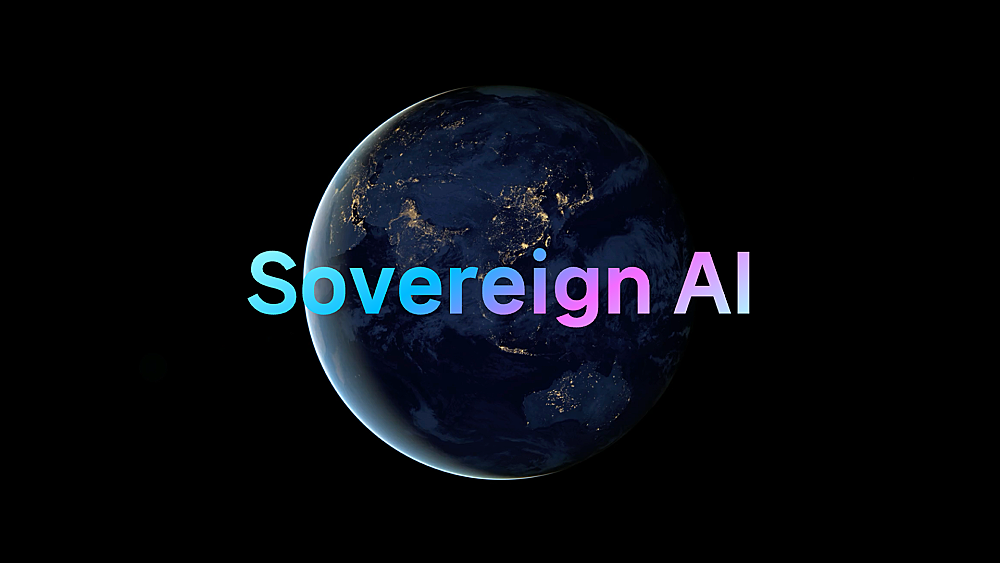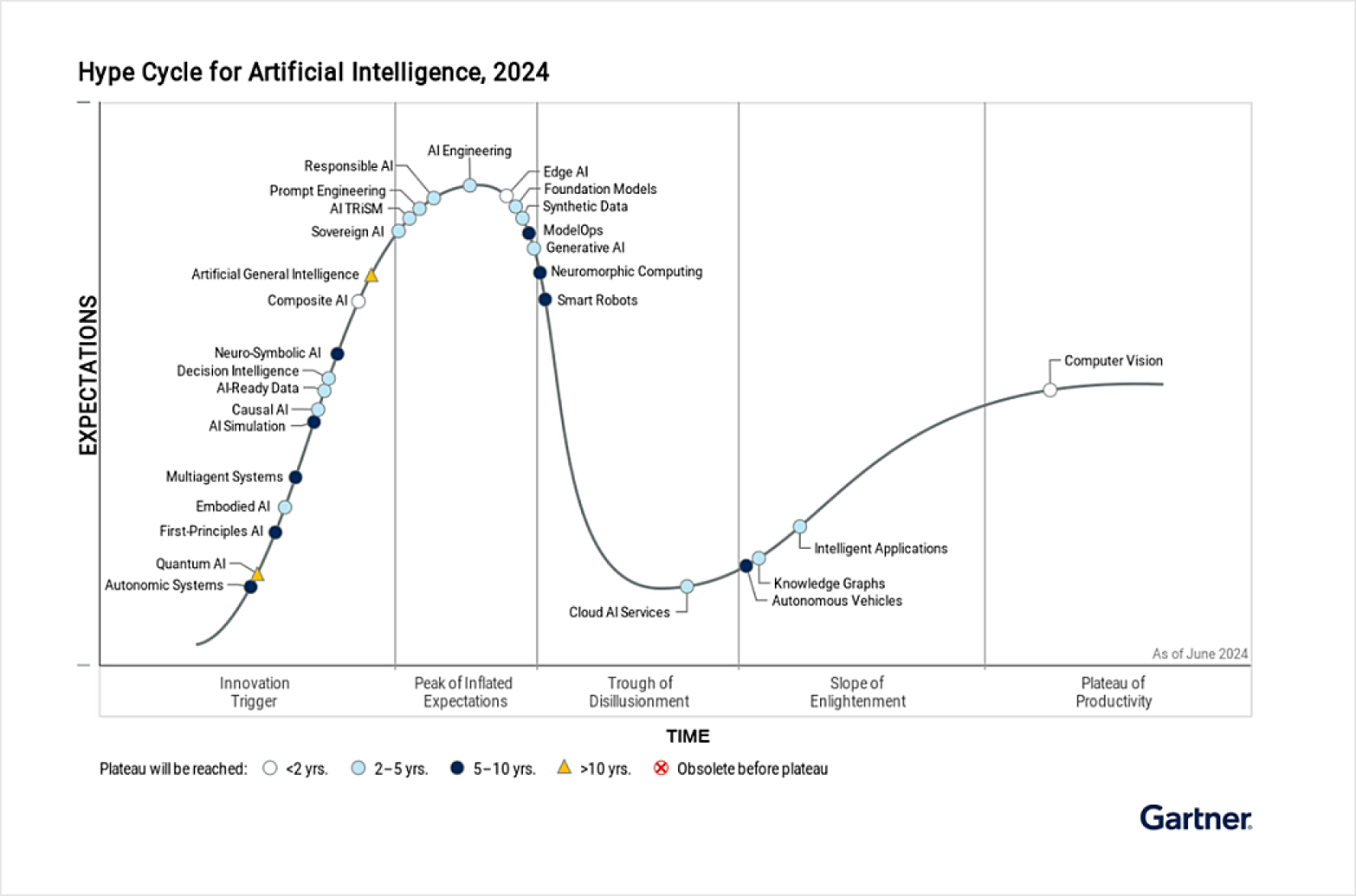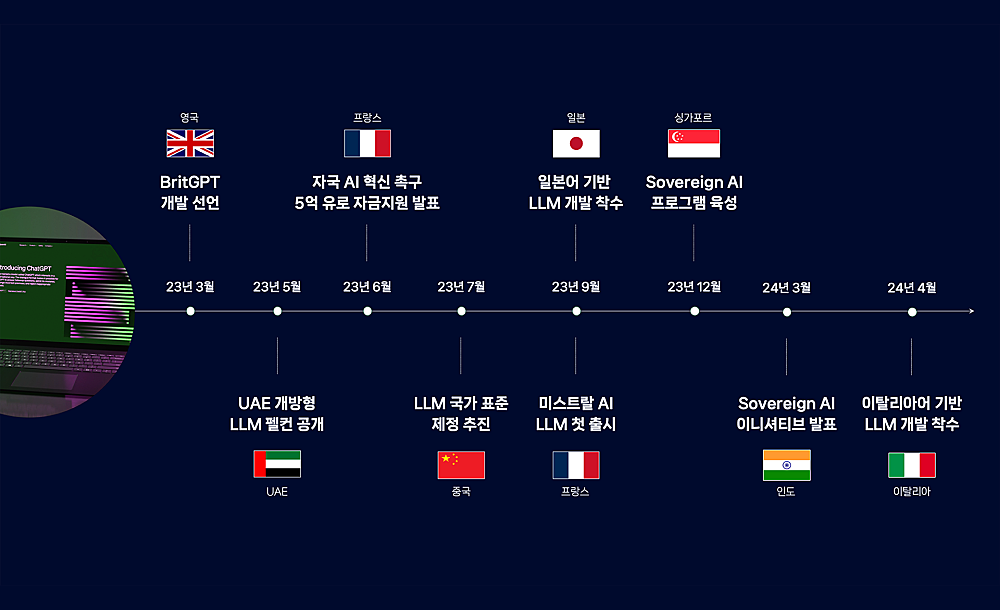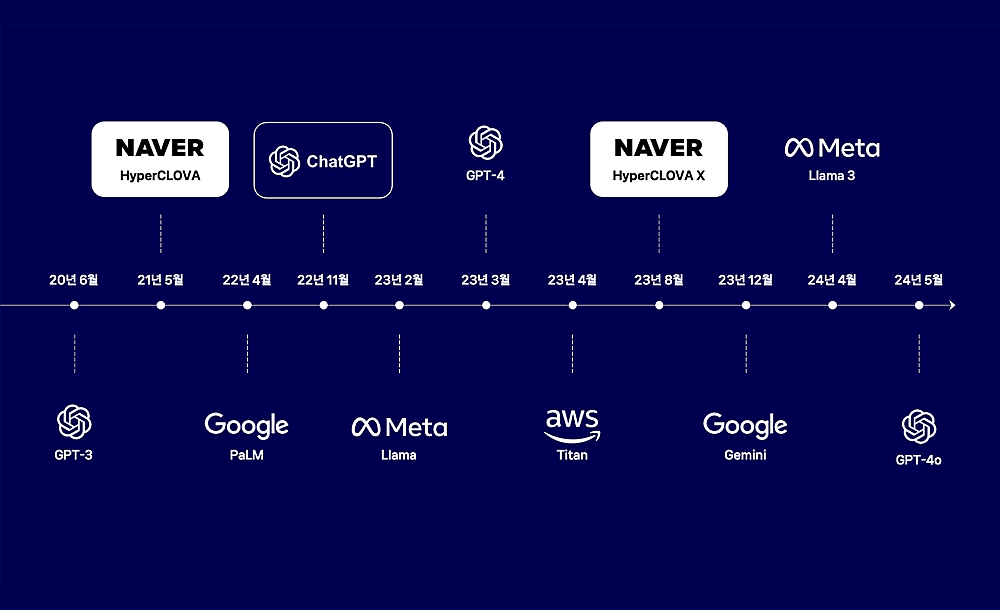Sovereign AI, challenge of the AI era
Have you heard of the term sovereign AI? The adjective sovereign means “independent” and “enjoying autonomy” and indicates that a nation has control over its policies and resources. Sovereignty has become essential to national independence and security, and its significance has only multiplied since the concept entered the realm of technology and data.
What does sovereign AI mean in the generative AI era? How should we prepare for it?

Technological advances in AI
Technological innovations have spurred growth and shaped human civilization in profound ways, and AI could be a game changer that marks an inflection point in the history of humankind.
AI has opened a new world of possibilities for human intelligence and creativity. We’re optimistic that it will solve problems that were formerly insurmountable, but we are also worried about its unprecedented disruptive power, which could cause issues in data privacy, ethics, and security and might lead to a monopoly on AI and cultural assimilation. Sovereign AI aims to tackle all of these issues and more.

Digital sovereignty recently made it to the Gartner Hype Cycle (which graphically represents the maturity of technologies and applications) as an emerging technology. Gartner predicted that the gap between countries with sovereign AI strategies and those without will widen significantly within the next five years.
Sovereign AI
Sovereign AI refers to a nation’s capabilities to develop and run AI systems that accurately reflect national and regional policies, culture, history, and values using its own data and infrastructure. But realistically speaking, different countries have different levels of AI capabilities.
Therefore, AI sovereignty should not be determined by whether or not nations can develop AI with local technologies but by whether the AI models they employ reflect their ethical and cultural norms and whether these models can sustain economic growth and foster diversity. This is why training models with the right data and having an independent cloud infrastructure matter.
The principles of comparative advantage and free trade dictate that economies that best produce the goods should specialize in them to maximize benefits. Then why don’t these principles hold up for AI sovereignty, and why is monopoly harmful in AI?
First and foremost, AI monopoly can harm diversity.
This is apparent when we look at how generative AI and large language models work. Generative AI is groundbreaking because it can understand the subtle nuances of human language and generate high-quality content. It is driven by large amounts of data, which cover everything from knowledge considered absolute truths to more subjective areas like language, culture, history, laws, norms, traditions, and values. What would happen if AI models trained on data that comes largely from one part of the world dominated the global market? It is likely that such models will overlook or distort the unique traits of other cultures and bring about cultural subjugation and assimilation in the long term.
These are the problems that we currently face. Today, AI models created by tech giants are trained predominantly on U.S. data, a striking 90 percent.

Second, AI technology has immense potential and disruptive power.
We expect generative AI to shift the paradigm of humanity, acting as the driving force of the future. But relying on another country for AI technologies could undermine a nation’s economic independence and global competitiveness. LLMs are designed so their performance improves with user interactions, making the possibility of a market monopoly and the digital divide more likely.
Global landscape of AI development

Building AI is technologically and economically challenging. Many countries in Europe and Asia are working to develop LLMs inspired by their native language and culture, but most are slow to make progress.
– In 2021, NAVER rolled out the world’s third LLM, HyperCLOVA.
– In 2023, Great Britain began building BritGPT.
– In 2023, France’s Mistral AI released its LLM, trained mostly in English data.
– In China, there are Baidu’s Ernie Bot and Alibaba’s Tongyi Qianwen.
– Arab countries and India launched LLM projects, but they have yet to be commercialized.
The widening technological gap in AI can worsen global economic imbalances, negatively impact national security and the labor market, and weaken national competitiveness.
A crucial challenge of the AI era
Sovereign AI is essential for ensuring technological sovereignty and protecting national identity. It brings innovation and convenience to our lives without compromising important values like diversity.
Different governments and businesses should participate in creating a healthy AI ecosystem. There will be competition and coexistence to accelerate technological progress, which could lead to a safer and more efficient development of algorithms, allowing us to take a balanced approach to building AI in the long term.
NAVER tackles on sovereign AI
We’d like to focus on how NAVER’s technologies can help countries that lack the resources for AI development prepare for the coming AI era.
Consuming information in the AI age
Generative AI is built from large language models (LLMs) to generate content across text, images, and audio. Because the AI industry relies on large amounts of data and vast computing resources, a few big tech companies that can afford to make these investments have come to dominate the market. (Popular LLMs include ChatGPT, Gemini, and HyperCLOVA X.)
AI models developed by big tech companies are becoming ever more powerful through continuous data training and user interactions, but concerns are also growing over the production of culturally biased content and concentration of power.
In the Internet age, we had a choice over which content we wanted to view. We compared different search results and determined the trustworthiness of the information. We scrolled through social media feeds to pick out stories that piqued our interest and read news articles with different perspectives. But the way we consume information has changed drastically with the advent of LLMs and AI chatbots. Now, generative AI gives customized answers according to pre-configured settings.
1) Create personas: “Pretend you’re an interviewer. Think of yourself as a novelist.”
2) Set listeners: “Recommend guitar riffs for would-be guitarists.”
3) Give information: “Draw up interview questions from my resume and these job postings.”
4) Get action lists: “Tell me strategies for managing business loans.”
5) Set rules: “Rule out certain words or stay off certain topics when generating answers.”
6) Set format: “I’d like to get the text output in JSON format.”
7) Give examples: “Take this as an example and output responses in this format.”
Though this makes our lives more convenient, we also risk losing critical reasoning skills and different perspectives. When building safe and responsible AI models, we must consider these risks above all else, and they are all the more reason to develop diverse AI models.
※ Explore further: The dangers of controlling information as seen in novels

– In George Orwell’s “Nineteen Eighty-Four,” Big Brother controls and manipulates information to suit his whims and retains hold of the past to maintain power in the present and future.
– In Aldous Huxley’s “Brave New World,” people seem to be happy and comfortable in a technologically advanced society, but in fact, they can only access information permitted by the regime and consume content that is provocative and pleasure-seeking.
In both books, people lead their lives as designed by the totalitarian rulers. Their ability to think critically is taken away and their values are ignored. Though they take different paths, the two dystopian novels are both prescient in their own way in today’s AI era.
Our philosophy
We take a diverse and inclusive approach to designing our technologies. At NAVER, we firmly believe that respecting diversity creates greater values. From our search engine, which connects users to information, to cloud services that allow everyone to benefit from cutting-edge technology and AI products that address real-world challenges by drawing on past data, we deliver services that connect people, knowledge, and technology with this same philosophy in mind.
At NAVER, respecting diversity means achieving data sovereignty. NAVER’s sovereign cloud allows you to set up data centers at your location so you can comply with local data residency and collection laws. You take complete control over hosting sensitive workloads and managing data privacy so you can meet data sovereignty requirements.
The same goes for AI. NAVER’s sovereign AI models aim to provide the foundation for countries that lack the resources to develop AI, allowing them to build models that reflect their culture and values. NAVER’s advanced technologies can help other nations achieve AI sovereignty as we work together to create a healthy and responsible AI ecosystem.
NAVER’s sovereign AI capabilities
Many countries see sovereign AI as necessary, but the technological gap makes it harder for some nations to achieve AI sovereignty than others. Did you know that NAVER is the only company with local capabilities to build a hyper-scale AI model from the ground up in a language other than English or Chinese and experience creating a cloud-based AI ecosystem?

Leveraging HyperCLOVA X for AI sovereignty
In 2021, NAVER introduced HyperCLOVA, just the third LLM in the world. In 2023, we rolled out an upgraded version, HyperCLOVA X. Developed locally in a non-English-speaking country, HyperCLOVA X shows an unmatched understanding of the Korean language and its socio-cultural context compared to other models developed globally and outstanding English capabilities.
Countries that strive for AI sovereignty but lack the means can use HyperCLOVA X to build their LLMs. They could train custom LLMs using data in their own language, as well as those of neighboring countries and English. Such models will acquire general expertise with English data and outperform others in their own history, society, and culture.
Our vision is to collaborate with other nations on the development, investment, and operation of LLMs, using NAVER’s technologies to help them ensure AI sovereignty and create sustainable growth models. By exporting our technologies, we hope to foster an AI ecosystem and strengthen national competitiveness on a global scale.
Using hybrid cloud to enable LLMs
Governments and businesses want to protect sensitive information when using LLMs. To this end, we invest heavily in hybrid cloud capabilities, and it is one of the reasons LLMs powered by NAVER’s AI are getting a lot of attention.
Sovereign AI and efficiency
When discussing sovereign AI, efficiency is just as important as national sovereignty. Adopting the AI technologies of the big tech companies might seem convenient, but sovereign AI could be a better strategy in terms of costs and performance optimization.
A model’s performance depends on the training data, which is why English-centric models show varying performance depending on who uses them. Instead of large companies developing AI models that can understand a wide range of languages, it might be more efficient for nations to build AI models with strengths in their language and culture because it takes much less data and fewer GPUs.
AI is leveraged across businesses, so efficiency also matters when applying the technology. Sovereign AI models optimized for a specific language and context is likely the better choice to ensure the same level of performance as the general-purpose AI models developed by big tech companies.
Sovereign AI can help close the technological gap between nations in the short term. We expect relatively smaller models to perform on par with the popular global models at less cost.
Fostering an AI ecosystem
We looked at sovereign AI from multiple aspects. The rise of AI will transform most industries, making sovereign AI all the more important. Sovereign AI will play a vital role in ensuring a nation’s cultural identity and data sovereignty and help it adapt to a fast-paced world.
At NAVER, we want to ensure that the advent of AI does not benefit a handful of countries. Governments and businesses worldwide must collaborate to create a healthy AI ecosystem, which is why we strive to address challenges around sovereign AI. We believe that everyone should benefit from the convenience of technology and that we should work to create an environment conducive to diversity.
